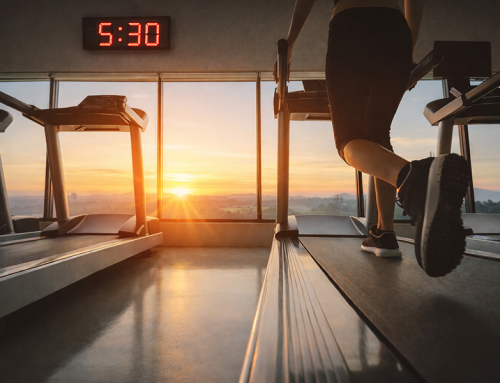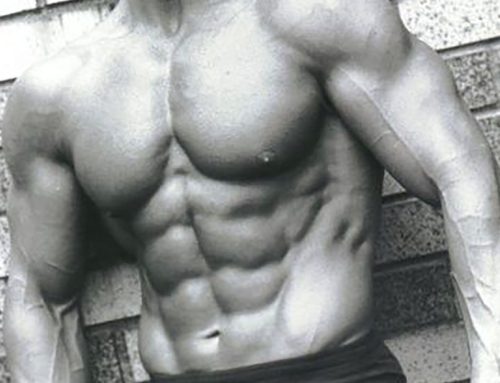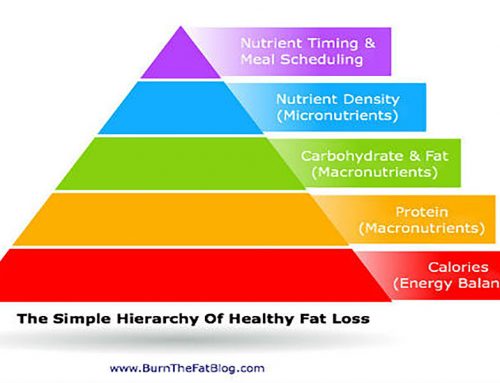It was once fashionable in the diet industry to suggest things such as “Eat breakfast like a king, eat lunch like a prince, and eat dinner like a pauper” or even, “Don’t eat after 6 pm.” At one time, I recommended a strategy I named calorie tapering (or carb tapering). This called for larger meals earlier in the day and smaller meals later in the day, or even no eating at night.
 Funny enough, these diet “timing” strategies were sometimes mocked as being fads or “bro science.” Now a new study suggests there may have been something to “front loading” calories all along.
Funny enough, these diet “timing” strategies were sometimes mocked as being fads or “bro science.” Now a new study suggests there may have been something to “front loading” calories all along.
Enormous amounts of observational research has shown that eating breakfast is associated with better weight loss. But whether breakfast eating is better for weight loss in a cause and effect sense has always been debatable.
In the past, eating more at specific times of the day was considered a priority. Both the post-workout meal and breakfast have been referred to as “the most important meal of the day.”
More recently, opinions shifted to the consensus that nutrient timing matters, but is not the most important priority compared to overall calorie and macro intake for the whole day. Most evidence-based nutritionists and coaches now say that meal timing, size, and frequency should be left to personal preference (within appropriate limits, of course).
A new study published in The Journal of Clinical Endocrinology & Metabolism suggests that nutrient timing (in this case, eating a larger breakfast) does influence weight loss and calorie expenditure after all.
The subjects were 16 men who were not overweight. They were divided into two groups. Group one ate a low energy breakfast (only 11% of daily calories) and a high energy dinner (69% of daily calories). Group two ate a high energy breakfast and a low energy dinner in the same ratios.
The results: Diet-induced thermogenesis (“metabolism”) was 2.5 times higher after breakfast than after dinner, regardless of the calorie content. Hunger increased after low-calorie breakfasts and remained higher all day, while hunger decreased after high-calorie breakfasts. Subjects who ate the higher-calorie breakfast also had better blood glucose regulation and lower appetite for sweets later in the day.
The authors said that over the long term, this type of nutrient timing schedule (bigger breakfast, smaller dinner) might produce a lower calorie intake, higher energy expenditure, and lower body fat.
The abstract concludes:
“Extensive breakfasting should be preferred over large dinner meals to prevent obesity and high blood glucose peaks even under conditions of a hypocaloric diet.”
In a news release, the lead author also said:
“We recommend that patients with obesity as well as healthy people eat a large breakfast rather than a large dinner to reduce body weight and prevent metabolic diseases.”
It would be easy for fans of breakfast eating (like me) to use this study as evidence against any dietary protocol that allows or encourages skipping breakfast. That’s how it appears at face value. However, there were limitations to the study. To confirm the results with more certainty, future studies of this kind should be longer in duration, with larger sample sizes, and well-trained subjects, including women as well as men.
It’s also worth pointing out that plenty of people are successful at weight control without breakfast, including those on time-restricted feeding diets where calories are back-loaded (big dinner). That kind of diet is not for me (try to take away my a.m. eggs and oatmeal and you’re losing fingers!), but for some people, it appears to fit their lifestyle, suit their preferences, is sustainable, and doesn’t cause hunger problems.
But there’s growing evidence that even if someone prefers a time-restricted, back-loaded eating schedule, front-loading calories could be just as effective. Some scientists who study chronobiology and circadian rhythms are now even saying that it’s better – they’re calling it “early time restricted feeding.”
At any rate, the idea that skipping breakfast is somehow superior for weight loss – an idea that was being pushed a lot in recent years – is not well-supported by science and never was.
The truth is, if someone chooses to regularly skip breakfast and then sees better weight loss, the reason is not because of any dietary magic, it’s because this change resulted in that person eating less. A different person might have ended up over-compensating later in the day by eating more, leaving them no better off, or even gaining weight.
Maybe the “skip breakfast” idea only got as popular as it did because trendy diets like intermittent fasting called for it. And perhaps if someone did want to skip a meal, it’s more convenient and socially suitable to skip it in the morning and eat like a king at dinner.
Let’s also not forget that good old bodybuilding nutrition, with 4 to 5 protein-containing meals spread evenly across the entire day is still as effective as ever for fat loss. It’s also still the most popular diet strategy among physique athletes. In addition, research on protein metabolism suggests this classic bodybuilder approach is superior on the muscle-building side as compared to infrequent feeding or breakfasts that lack protein.
Bottom line: This study shows a favorable effect from putting more calories at breakfast, but we do have to acknowledge that nutrient timing of any kind is secondary in importance to overall daily calorie and macronutrient intake, and there’s more than one way to set up a daily eating schedule that works.
The only person who is really wrong about diet is the person who insists his way is the only way or the best way for everyone.
Weight loss is achieved by sustaining a calorie deficit, and whatever meal schedule and calorie timing helps you achieve that deficit the easiest (including by controlling hunger) is usually the best choice when weight loss is your goal.
Train hard and expect success,
Tom Venuto,
Founder, Burn the Fat Inner Circle
Author, Burn the Fat, Feed the Muscle
Author, Burn the Fat, Feed the Muscle Guide to Building Muscle With Progressive Overload Training
Scientific Reference:
Twice as High Diet-Induced Thermogenesis After Breakfast vs Dinner On High-Calorie as Well as Low-Calorie Meals. Richter J et al, The Journal of Clinical Endocrinology & Metabolism, 105:3, e211-e221, 2020






So happy to read this—because I have been really enjoying my eggs and oatmeal too! or my oatmeal with whey!!
Hooray for Breakfast!!! Oh and I should mention that my workouts are early a.m. –so a big breakfast after just makes sense:)
oatmeal + whey … the 3 minute breakfast FTW!
Well they can’t both both be right! I was m going to vote for a big lunch. With a work out two hours later. al
well …. sometimes both sides CAN be right…. more than 1 way to skin a cat eh? But… My vote always has been, and still is with big breakfast. (won’t stop me from an occasional evening feast though. :-) )
Hi Tom, I have a question about metabolism…is it possible to have a high metabolism, but still be overweight? I always find that even when I eat things like oats etc it doesn’t sustain my hunger…it’s almost like it increases my metabolism and makes me more hungry….does that make sense? Cheers, Claire
Hi Claire! thanks for your post. You’ve actually brought up two different topics. One is metabolism. most people’s metabolisms – at least the basal metabolic rate – don’t vary that much if they weight the same and or have the same body composition. There is some inter-individual variation but not much. Theres misconception about what fast metabolism is. Basically bigger people have “faster metabolisms” (bigger bodies burn more calories at rest and during exercise). And also a “fast metabolism” is someone who is highly active (including non exercise activity) so they burn a lot that way, not just burn more at rest. So if you take one of these people with a “fast metabolism” or shall we say, someone who burns a lot of calories and they are still overweight, there is one explanation: They are STILL eating more than they are burning. The other topic you brought up was hunger. For sure, certain foods may make you feel more full than others, and some foods may leave you more hungry. if you are left hungry, you may eat a lot more than you think across the day and still consume too much to lose fat, despite the high total daily calorie burn. So, anything you can do to suppress hunger in this case will help – whether that is changing foods eaten, eating foods in different combinations or switching macros. Also eating protein at every meal is appetite suppressive, and so is eating fiber (foods/veggies with bulk). If you find a specific food that is not filling /satiating try: switch to different food or different mix of macros (maybe more protein and fat, less carb), and or add whole food protein (like eating oatmeal with whole eggs) and or add fiber (like berries with the oatmeal). Then see what happens. Be open minded too. there is something called the satiety index that rates how full foods make you feel and potatoes ranked the highest, so which foods make you feel more full may not always be predictable/ intuitive and you might have to experiment. Cheers, Tom V
So if I fast but my first meal is front loaded with calories (even if it is at noon) and my dinner has fewer calories, that Fits with this research? It’s not about when you break your fast it’s just that your first meal after you break your fast should be the largest of the day?
Actually this study was not about fasting or time restricted feeding, but there is a connection between these topics when we talk about arguments for or against breakfast which is why I mentioned it. this one particular study was simply eating three meals a day breakfast in the morning, lunch at mid day and dinner at night and testing what would happen to metabolism, hunger, sugar cravings and blood sugar regulation with the biggest meal at breakfast (morning) versus biggest meal at dinner (night). It suggested higher diet induced thermogenesis in response to eating in the morning vs at night, also noted with big breakfast less hunger and cravings later, and better blood sugar control. restricted time feeding windows were not examined in this study. However, in the past few years other studies were done suggesting that if someone did want to follow a time restricted feeding diet, it does not have to mean skipping breakfast or making the feeding window late in the day; these other studies suggest a feeding window in morning and afternoon, the not eating in the late day works as well or even better. We could probably extrapolate this and confirm what you are suggesting – that if youre not a morning breakfast person, you certainly could make your first meal of the day (lunch) the biggest. The main point is that big breakfasts in the morning have been shown in research to have benefits and that skipping breakfast is not superior for weight loss, despite this belief in the IF / time-restricted feeding crowd. The best diet for weight loss is the one that a person can stick to the best, suits their lifestyle and preferences and helps them achieve and maintain a calorie deficit the easiest. People who want to maximize building muscle mass however, are better off eating 3 to 5 times a day, with every meal including protein, and spreading them out across the whole day.
Tom it’s Vinny White long time fan!
What are your thoughts on training on a empty stomach !
Hi Vinny. For lifting: Not optimal. Lifting on empty can reduce lifting performance in some people (see. https://www.burnthefatinnercircle.com/public/Is-Fasted-Weight-Training-A-Bad-Idea.cfm. and https://pubmed.ncbi.nlm.nih.gov/30707135/). but if it doesn’t hurt your lifting performance, its an option for people who don’t want to train in close proximity to a meal For cardio: doesn’t really matter – do it when its convenient. But research suggests it probably doesn’t help increase fat loss after all: https://jissn.biomedcentral.com/articles/10.1186/s12970-014-0054-7
Hi Tom, I’ve heard people say that if you only eat twice a day this means that you have a larger fasting period and therefore your body produces less insulin to deal with the food, this would assist in weight loss. True or not?